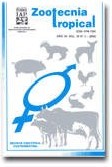
|
Zootecnia Tropical
Instituto Nacional de Investigaciones Agrícolas Venezuela
ISSN: 0798-7269
Vol. 27, No. 2, 2009, pp. 215-219
|
 Bioline Code: zt09024
Bioline Code: zt09024
Full paper language: Spanish
Document type: Note
Document available free of charge
|
|
|
Zootecnia Tropical, Vol. 27, No. 2, 2009, pp. 215-219
| en |
Evaluation of a selective control program in dual purpose calves infected with digestive strongylid
Sandoval, Espartaco; Morales, Gustavo; Jiménez, Delia; Pino, Luz A. & Marquez, Oswaldo
Abstract
In order to evaluate the impact of a program of gastrointestinal strongylid selective control, 35 crossbreed calves
reared under continuous grazing in a dual purpose farm were used. The farm is located in an area classified as
tropical dry forest in Yaracuy state (Venezuela). Calves were coproscopically examined every 15 days by means
of the McMaster technique and the results expressed in egg per gram of feces. All the calves with high infestation
degree were drenched during the next sampling with a long persistence anthelmintic product (Ivermectine 3.5%).
Haematocric and live weight were also determined. Calves that were not required to be drenched were subjected
to the same evaluation monthly. The results showed a continuous diminution of the proportion of calves with
high infestations degree, which started in 28.6%, but at the end of the observation period this percentage was only
14.3%. The high infestation degree in animals that were able to maintain acceptable productive levels indicate
that these calves were resilients. The importance of selective anthelmintic treatment of the resilient fraction
within the herd for gastrointestinal strongylids control is discussed.
Keywords
strongylids, selective control, resilience, bovine
|
| |
| es |
Evaluación de un programa de control selectivo en becerros doble propósito infectados con estróngilos digestivos
Sandoval, Espartaco; Morales, Gustavo; Jiménez, Delia; Pino, Luz A. & Marquez, Oswaldo
Resumen
Con el objeto de evaluar el impacto de un programa de control selectivo de la infestación por estróngilos
digestivos, se utilizaron 35 becerros mestizos infestados en condiciones naturales en potreros bajo un esquema
arbitrario de rotación, pertenecientes a una explotación de doble propósito, ubicada en una zona de bosque seco
tropical. Cada 15 días los animales eran examinados coproscópicamente mediante la técnica cuantitativa de
McMaster y los resultados expresados en huevos por gramos de heces (hpg). Los individuos que resultaron con
niveles de infestación elevados (>700 hpg) fueron tratados durante el muestreo siguiente con un producto de
larga persistencia a base de ivermectina 3,5%. Se determinaron además el hematocrito (ht) y el peso vivo (pv).
Los animales que no requerían tratamiento fueron sometidos a la misma evaluación cada 30 días. Los resultados
señalan una disminución de la proporción de animales con niveles altos de infestación que comenzó con 28,6%
y al final del periodo de observación alcanzo 14,3% del total de animales del grupo experimental. Los altos
niveles de infestación en animales capaces de mantener niveles productivos aceptables indican que se trata de
animales resilientes. Se discute la importancia del tratamiento selectivo de la fracción de animales resilientes en
la disminución de la contaminación del pastizal con las formas de diseminación de los estróngilos digestivos.
Palabras-clave
Estróngilos, control selectivo, resiliencia, bovinos
|
| |
© Copyright 2009 - Zootecnia Tropical
Alternative site location: http://www.sian.inia.gob.ve/repositorio/revistas_ci/ZootecniaTropical/ztindice.htm
|
|
